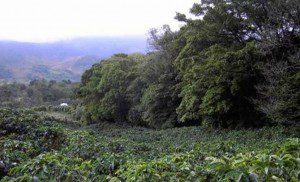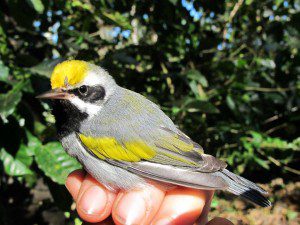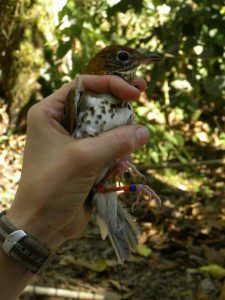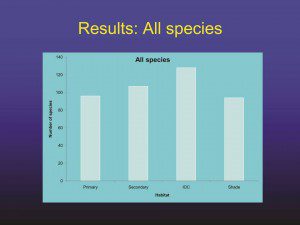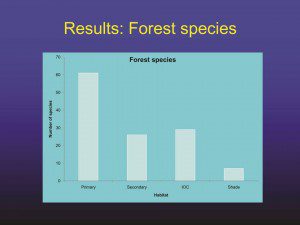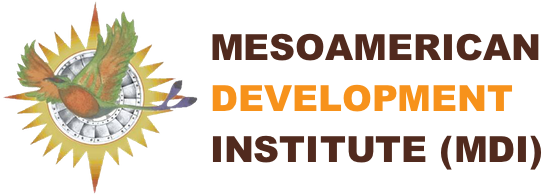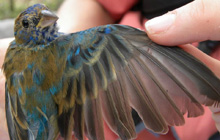
IOC production and biodiversity
The loss of forest and the potential loss of native biodiversity resulting from coffee cultivation and processing is substantial. Certified shade-grown coffee is a preferable alternative to sun coffee in terms of the preservation of tropical rain forest biodiversity, though recent studies have revealed important limitations of shade coffee, particularly “commercial polyculture” which is the only type of shade coffee cultivation widely practiced in Costa Rica. These limitations include the loss of tropical species that depend on primary forests because many of the important habitat features typical of mature forests, such as lianas, bromeliads and large trees, are under-represented or absent in all but the most rustic coffee plantations.
At Montes de Oro Cooperative, Miramar, Costa Rica, a new system has been developed for coffee cultivation that maintains native forest without sacrificing yields. This system is termed “Integrated Open Canopy™ (IOC)” in which coffee is planted in 1-3 ha patches with varying amounts of shade, depending on local conditions, but typically too little to qualify for shade coffee certification. Coffee patches are surrounded by an equivalent amount of forest. A typical parcel within the cooperative would be 4-6 ha in size, which would result in units of production consisting of 2-3 ha coffee and 2-3 ha of forest. The important feature of this system, from a standpoint of biodiversity, is that it maintains forest habitat for species that do not use shade coffee plantations.
These forest-dependent species that benefit from IOC production include Neotropical migrants such as the Golden-winged Warbler, which is identified by Partners in Flight as perhaps the most threatened Neotropical migrant species not already protected under the U.S. Endangered Species Act (ESA), and the Wood Thrush.
IOC™ coffee production also offers important economic benefits to farmers, including greater yields since more open codnitions result in lower levels of disease, and most significantly, the opportunity to trade carbon sequestered on their property. Potential revenues from sales of carbon offsetts are estimated at between 15% to 20% of the revenues generated through coffee sales.
Coffee is one of the most significant agricultural systems in Latin America, where 700,000 coffee farmers manipulate nearly 40% of agricultural lands to generate $10 billion annually. In a partnership with the US Forest Service Northern Research Station, the Mesoamerican Development Institute, Cooperative Montes de Oro (Costa Rica), Cooperative COMISUYL (Honduras), the Department of Natural Resources Conservation at the University of Massachusetts, we have studied and surveyed IOC production for seven seasons.
IOC production benefits the environment and the farmer (land owner)
Advantages for the environment:
- Increase in forest cover providing habitat for many forest-dependent species, including some migratory birds, that are not found in shade coffee
- Development and preservation of forest habitat for carbon sequestration
- Increase in biodiversity and habitat complexity provided by forest buffers that are a component of IOC production
- Greatly enhances all hydrologic conditions for the environment
Advantages/incentives for the coffee farmer:
- Significant increase in yields (typically 3x) for small farmers
- Reduction in labor by concentrating the area of production
- Additional revenues from carbon trading (equivalent to 15% to 25% premium in coffee revenues)
- Reduced spread of infections due to forest buffers
- Increased coffee pollination
Try The Sustainable Coffee Created From The Mesoamerican Development Institute Research
- It is the first coffee to be processed using 100 per cent clean, renewable energy from solar panels.
- protects tropical forests and creates rich, biodiverse growing conditions around coffee farms.
- Certified Organic Coffee, Cafe Solar® makes use of a special organic fertilizer derived from coffee pulp.
Donate To the Research!
Your Funding Helps with:
- Increasing sustainability in the coffee industry using innovative clean energy technology and forest-friendly farming methods.
- Helping independent farmer organizations by providing economic security, valuable training and better job opportunities.
- Supporting women in important management positions in Central America.

